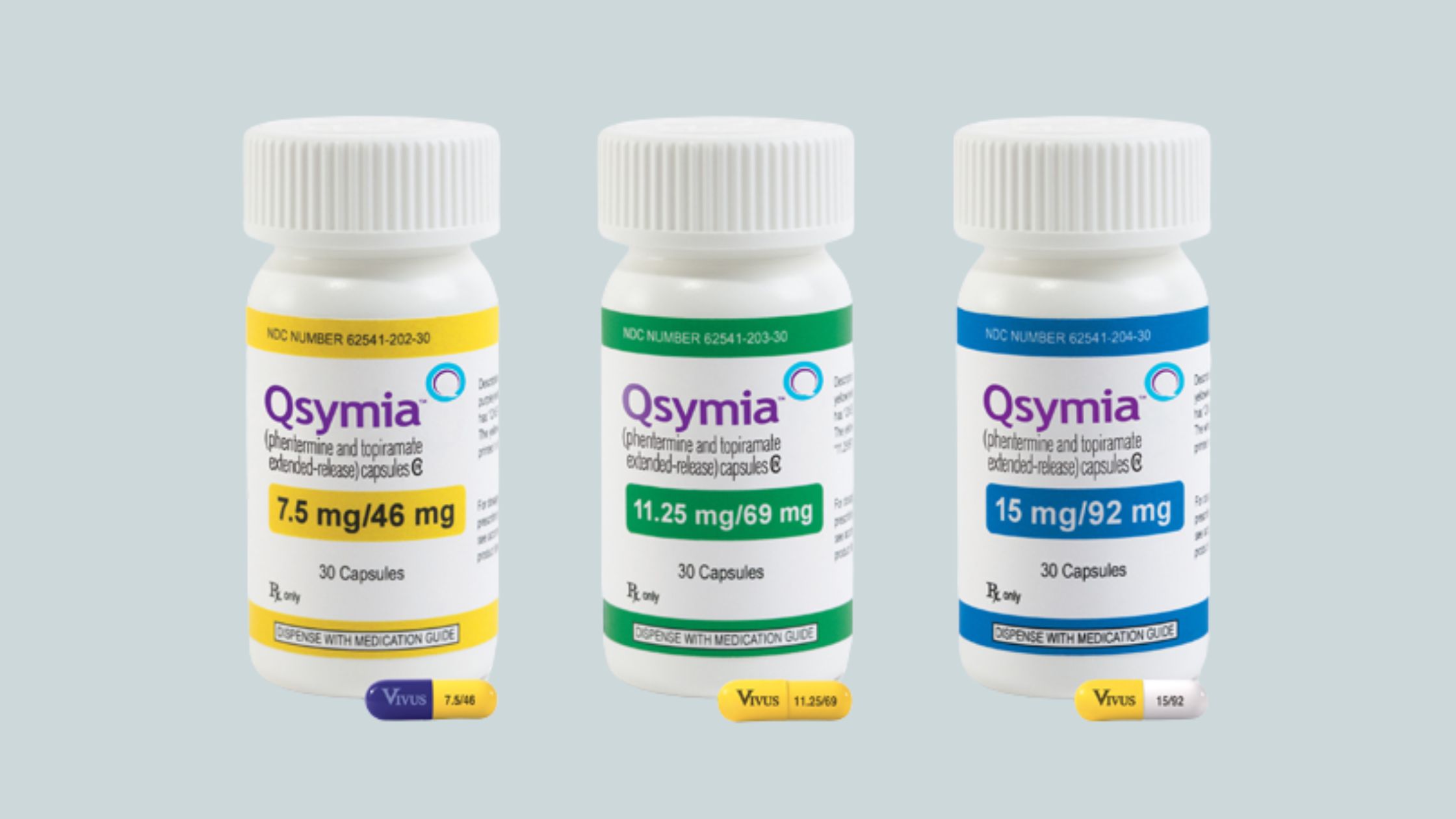What is Qsymia?
Qsymia is a prescription weight loss medication that combines two active ingredients: Phentermine and Topiramate. It is an FDA-approved treatment for chronic weight management in individuals with obesity or overweight conditions who have at least one weight-related health issue.
Phentermine is a stimulant that suppresses appetite, while Topiramate is an anticonvulsant that helps with satiety and reduces cravings. Together, they create a powerful dual-action approach to weight loss by both reducing hunger and making individuals feel fuller with smaller meals.
How Does Qsymia Work?
Qsymia works through a two-part mechanism:
- Phentermine’s Role
- Acts as a central nervous system stimulant that increases heart rate and energy levels
- Suppresses appetite by boosting norepinephrine, which signals the brain to eat less
- Helps users maintain a calorie deficit by reducing hunger cues
- Topiramate’s Role
- Alters brain neurotransmitters to reduce food cravings
- Slows digestion and enhances satiety, making people feel full faster
- Lowers emotional eating triggers by reducing reward-related food cravings
Who is Qsymia For?
Qsymia is prescribed for individuals who:
- Have a BMI of 30 or higher (obese category)
- Have a BMI of 27 or higher with at least one weight-related health condition, such as type 2 diabetes, high blood pressure, or high cholesterol
- Have struggled with diet and exercise alone and require medical assistance to manage weight
Key Benefits of Qsymia
- Leads to significant weight loss when combined with a reduced-calorie diet and increased physical activity
- Reduces appetite, food cravings, and emotional eating
- Helps improve blood sugar control and cholesterol levels
- Shown to lower blood pressure in some patients, benefiting those with hypertension
Potential Side Effects of Qsymia
As with any medication, Qsymia may cause side effects. The most common ones include:
- Dry mouth and altered taste sensation
- Tingling in hands and feet (paresthesia)
- Dizziness, fatigue, or trouble sleeping
- Mood changes, including anxiety or depression in some individuals
- Increased heart rate or palpitations
More serious but rare side effects include:
- Cognitive issues (“brain fog”), such as difficulty concentrating or memory loss
- Metabolic acidosis, which can cause kidney stones and electrolyte imbalances
- Potential birth defects if taken during pregnancy
How is Qsymia Taken?
- Qsymia is an oral capsule taken once daily in the morning to avoid sleep disturbances
- The dosage is gradually increased over a few weeks to minimize side effects
- Patients should drink plenty of water to prevent dehydration and kidney stone formation
Who Should Avoid Qsymia?
Qsymia is not suitable for everyone and should be avoided by individuals who:
- Are pregnant or trying to conceive, as it may cause serious birth defects
- Have a history of heart disease, stroke, or uncontrolled high blood pressure
- Have glaucoma or an overactive thyroid
- Have a history of depression, anxiety, or mood disorders, as it may worsen symptoms
- Are taking MAOI antidepressants or other stimulant medications
Weight Loss Potential with Qsymia
Clinical trials have shown that Qsymia can help patients lose an average of 5 to 10 percent of their total body weight over 12 to 52 weeks. Patients who combine Qsymia with a healthy diet and regular exercise tend to experience more sustainable long-term weight loss compared to those who rely solely on medication.
How Long Should Qsymia Be Used?
- Qsymia is designed for long-term weight management, unlike short-term options such as Phentermine alone
- If a patient does not lose at least 3-5 percent of their body weight after 12 weeks, a doctor may adjust the dosage or discontinue use
- Regular medical check-ups are recommended to monitor progress and adjust the treatment plan as needed
Qsymia vs. Other Weight Loss Medications
Compared to other medications like Wegovy, Ozempic, or Mounjaro, Qsymia works primarily by suppressing appetite and modifying brain chemistry, rather than slowing digestion or regulating insulin levels. It is a good option for individuals who need help controlling hunger but may not be suitable for those with heart conditions or stimulant sensitivity.
Is Qsymia Right for You?
Qsymia can be highly effective for individuals who struggle with excessive hunger, binge eating, or portion control. However, it should be used under strict medical supervision to ensure safety and effectiveness. Before starting Qsymia, it is important to have a comprehensive health assessment to determine if it aligns with your weight loss goals and medical history.
























